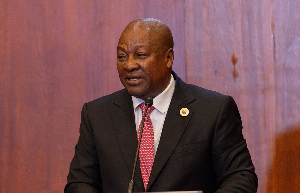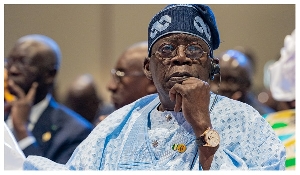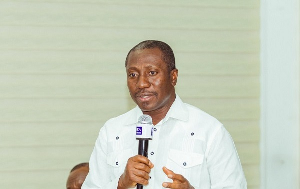Opinions of Friday, 7 April 2017
Columnist: Schandorf, Sidney Laud
A project manager's letter to a new president
Dear Nana,
I bring you greetings from Obi Manso where the quest for higher education and a “better life” have brought me. A few years ago, I wrote to your predecessor when the economy was giving us a sound beating. Today, I write to you to discuss an entirely different subject, your promise that “change has come.”
Let me begin by congratulating you on your resounding victory which suggests that the Ghanaian voting population has reposed great confidence in you. I read your promises as outlined in the NPP manifesto, lofty and ambitious, particularly for a four (4) year term. In this letter, I want to share some thoughts that you may find useful to your journey to realizing the “change has come” mantra.
1. Projects as the catalyst for change Even a cursory reading of your promise to Ghanaians reveals that several projects must be executed if your words can be kept. Example one village, one dam or one district, one factory, etc. Implicitly, you agree with scores of research that projects are the means to deliver on strategy, in this case electoral promises. It stands to reason that the capacity of your government to deliver on the contents of the 2016 manifesto are directly hinged on your ability to execute projects in a timely manner to return value to Ghanaians. Georg Wilhelm Friedrich Hegel reminds us that “we learn from history that we do not learn from history.” It is here that history does not engender confidence in our collective execution apability.
2. Our checkered project past I have been on the quest to find a single project over the last decade or so that has been executed on time, under budget to the desired quality, irrespective of the government in power. It may well be that many of such exist but they are not public knowledge or that I have not looked hard enough. The Accra-Kumasi road, “Job 600,” the Shiashie-Legon road, affordable housing, Tech parks, Hope City, NIA, NHIA, etc. are all living testaments to the inability of successive governments to deliver on time, on budget, to quality or the ability to deliver without bringing value to the Ghanaian people. Sir, if any of this history is anything to go by, then we see in them troubling harbingers of what might happen to your many good intentions. I appreciate that your government is in a “hurry” but it is here that I want to sound some caution from some MIT scholars, “great projects have a long period of definition.” As I opine in one of my papers, “project initiation portends completion.” Again, a strong business case coupled with strong program and project management frameworks increases the likelihood of success and value.
3. The need for Business Analysis (business need, business case and requirements management) The Project Management Institute (PMI) has some startling statistics for us: “For every dollar spent on projects and programs, 5.1 percent is wasted due to poor requirements management.” Further, “47% of unsuccessful projects fail to meet goals due to poor requirements management.” IAG Consulting reports “74 percent of companies as having a low level of requirements management maturity, resulting in missed deadlines, budget overruns and wasted resources.” As an ardent guarder of A project manager’s letter to a new president | 1 Ghana’s purse, I believe it is becoming increasingly clear that these statistics are much graver on our side of the globe putting Ghana’s limited resources and your delivery at risk.
Business Analysis which covers identifying and documenting problems/business needs, evaluating and proposing solutions, eliciting, documenting and managing requirements in synergy with project managers to ensure project success will be an important tool in your arsenal. In some cases it can be extended to help us assess benefits post-project. What it helps us do is ascertain the business case for every project and when that is established to ensure we define the requirements properly so that we are not part of the 47% unsuccessful projects. It is here that stakeholder management becomes a key critical success factor.
4. Stakeholder management During electioneering campaigns, there is no business case required. The voting populace must largely be told what they want to hear, the opposition smudged beyond recognition and ourselves elevated as the gurus who hold the panacea to the country’s woes. When power has been won, though, election campaigns cease to be a sufficient business case for anything. I understand that you are in “hurry,” in your own words, to deliver on your campaign promises. Without empirical evidence, I put it to you, the lawyer that you are, that business cases do not exist for many of these projects. It remains doubtful that prior to your accession to throne, you had enough time to build a strong business case for each of your campaign promises, the ones you are so eager to execute. You and some ministers in your retinue have commented about the sorry state of affairs and in some cases with a hint of surprise. It is thus logically consistent to propose that even if you had business cases, many of your assumptions may have proven incorrect which may invalidate the case. In the light of the reality you inherited, it is again clear that some or many campaign promises need adjusting on the basis of business case alone.
A sage before us remarked, “uneasy lies the head that wears the crown.” I can understand the unease that will accompany any action that may be perceived as reneging on the promises made to Ghanaians, your stakeholders. I propose that you may have to disappoint us a bit in order to give us the kind of change that is lasting and not ephemeral. Calling on experts in project management and stakeholder management to help communicate to Ghanaians a realistic portfolio will be an important exercise to undertake for not all campaign promises can or must be executed. So with a pruned down list backed by credible, fact-based business cases what next?
5. Project Management as pivotal to any change agenda Project Management as a discipline is an imperative for your success. While Business Analysis and Requirements Management with scintillas of program and portfolio management might help you select the right projects, it is the execution by proven professionals that will ultimately be your doing or undoing. I would not ask a fresh medical school graduate to perform complex cardiac surgery; I would match him/her to their requisite skillset. Surely, I would choose Prof Frimpong Boateng over the best graduating medical student for any ardiothoracic surgery. It will be important to define the government’s approach to managing the project lifecycle in tandem with the other parts of the government machinery a good example being the public procurement act.
Our American friends are onto something with the recent signing of the Program Management and Accountability Act which seeks among other things to “enhance accountability and best practices in project and program management throughout the federal government.” We should take a cue from them and it is here that I recommend the use of trained professionals.
A project manager’s letter to a new president | 2
6. The role professional bodies can play Bodies like the Ghana Institution of Engineers, Ghana Institute of Surveyors, etc. provide your government and any subsequent ones with competent, certified and recognized professionals who will be the executors of your vision. It is in this regard that I propose that you consider the services of the Ghana Chapter of the Project Management Institute (PMI), the single largest professional body of internationally certified business analysts, project, program and portfolio managers. The associated Center of Excellence for Projects, Programs and Portfolios is another potent ally to consider. Through rigorous training and certification processes backed by strong technical domain knowledge, they are your allies in formulating or refining government’s approach to project, program and program management and to taking audacious steps towards an act like the Program Management Accountability Act. I have noticed your keen interest in streamlining public procurement. There is significant added value to streamlining public project management. It is here that I worry about your “hurry,” for hurry is what project failures are made of.
7. The limits of speed or the hurry There are two concepts that project managers use when it comes to “hurry:” project crashing and fast tracking. In simplistic terms, the former involves adding more resources so you can get more done in the same or less amount of time whereas the latter involves doing things in parallel rather than sequentially. Crashing almost always involves (optimal additional) cost. The real key here is that you crash or fast-track from a plan not simply because you are in hurry. There are limits to crashing and fast-tracking e.g. we cannot build the roof in parallel to the foundation no more can we construct the upper floors of a build until the foundation is in place. As much as possible then the planning process should be systematic and thorough and if at all there is haste, it should be in the execution phase, bounded by the cost and quality implications.
You, our learned vice president and others in government have been quick to announce dates when things like the NIA, the digital addressing system, etc. will be concluded, mostly by the end of the year 2017. This is problematic in at least two ways: first, as alluded to earlier, you are setting up expectations with your stakeholders that you or your execution team may not be able to meet and secondly, a proper requirements activity has not been carried out to determine the scope of work involved and consequently a realistic execution time frame.
For us as practitioners, our first estimates are referred to as rough order of magnitude (ROM) estimates and they may be off by up to 50%. It is thus probably prudent to hold of publicizing ROM estimates until some proper analysis is done. In campaign mode, ROM estimates may suffice but in real execution mode, it is best to assess.
The corollary is that you may box your project, program and portfolio managers into acquiescing into your promised timelines when on the face of the “pink sheets” of proven project practise and methodology they offer evidence to the contrary. Hurrying will likely lead to failure and further hits to the national kitty. There is much to be said but I want to leave you with some thoughts from the MIT Sloan school of management highlighting a few characteristics of “great projects.”
8. Towards Great Projects There are six out of seven things that Dvir and Shenhar share that I think are important:
a. Great projects create unique competitive advantage or exceptional value for its stakeholders.
A project manager’s letter to a new president | 3
b. Great projects begin with a long period of definition which focuses on defining a powerful vision and clear need and selecting the best execution approach.
c. Great projects create a revolutionary project culture.
d. Great projects have a highly qualified leader who is supported by top management.
e. Great projects maximize the use of existing knowledge.
f. Great project teams have a sense of pride and partnership.
Your government has made many promises that translate into projects. Some of these projects, filtered through the eyes of these six points and the content of this article, will not qualify as great projects. There is no question about your commitment to them as “top management.” I cannot say with certainty that there is a sense of pride and partnership irrespective of political affiliation. Fear grips me at the thought that we cannot say we have taken long periods of definition to many projects.
This may be an opportune moment to stop and reflect.
It is my hope that you will continue to demonstrate the bold leadership that can separate campaign promises from the great projects that will, to nearly panegyrize Donald Trump, make Ghana great again.
Much of the content of this article may inarguably not be new material to you but I trust that by reminding you of them, you will take the needed steps to leverage the proper practise of project management and its allied disciplines as crucial in your quest to guard the public purse and bring lasting change to Ghana.
Sidney Laud Schandorf, M.A., PMP, PMI-PBA, Prince2 Member, Communications Team The Center of Excellence for Projects, Programs and Portfolios. P.O. Box YK 1035, Kanda, Accra - Ghana 27-03-2017 2:37pmEST 18:37GMT Ottawa, Canada The author, Sidney Laud Schandorf, is a multi-certified project manager with demonstrated strengths in business analysis and project management in the Financial Services, Software and recently education domains. Some of his previous work has been on strategy, the intersection of theology and project management and the concept of value from projects. He is a member of the communications team of the Center of Excellence for Projects, Programs and Portfolios. References cited in this article. http://www.pmi.org/-/media/pmi/documents/public/pdf/learning/thought-leadership/pulse/requirementsmanagement.pdf https://www.pmi.org/about/press-media/press-releases/president-barack-obama-signs-the-program-m anagement-improvement-and-accountability-act https://www.congress.gov/bill/114th-congress/senate-bill/1550 Dvir D., Shenhar J.A.,What great projects have in common, MIT Sloan Management Review, Spring 2011, Vol 52. No. 3. A project manager’s letter to a new president | 4














